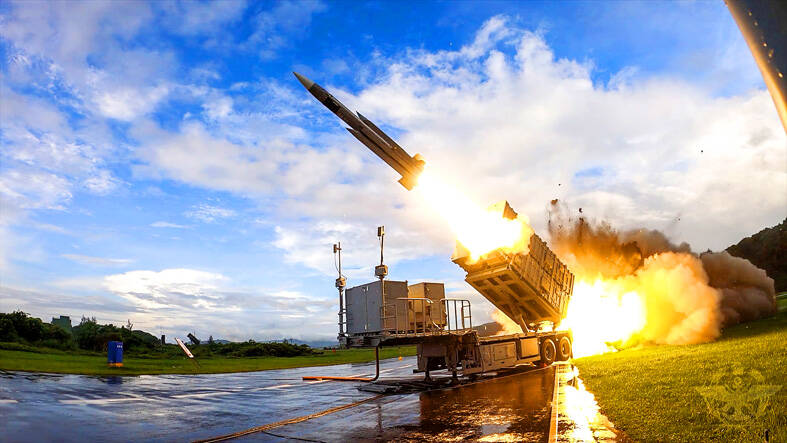The Ministry of National Defense plans to increase the production of anti-ship missiles from this year to 2025 to bolster the nation’s maritime defenses, an official said yesterday.
The extended-range variant of the Hsiung Feng III anti-ship missile is entering mass production this year, while the production volume of the Hsiung Feng II and the base model of the Hsiung Feng III is to be ramped up, the official said, speaking on condition of anonymity.
The estimated cost for the missiles this year is NT$15.5 billion (US$497.83 million), rising to NT$19.8 billion next year before peaking at NT$22 billion in 2025, they said.

Photo: EPA-EFE / Ministry of Defense / Handout
The ministry’s plan to increase its supply of anti-ship missiles comes as the Chinese People’s Liberation Army Navy accelerates its shipbuilding programs and conducts military exercises in the waters around Taiwan, they said.
The military considers anti-ship missiles the most direct and effective weapon system to check Chinese naval forces, the official said, adding that missile systems are to be deployed throughout the nation.
The Hsiung Feng II missile variant has a standard engagement range of 148km, while the new variant of the Hsiung Feng II missile being produced has a range of 160km to 200km, improved maneuverability and its electronic countermeasures are on par with Western systems, they said.
The Hsiung Feng III currently being used has a standard engagement range of 150km to 200km, while the extended-range variant has an effective range of 400km, the official said.
The improved Hsiung Feng III missiles are expected to significantly boost the engagement range of the nation’s anti-ship weapons and enhance the military’s ability to strike targets in seas to the north, south and east of Taiwan proper, they said.
The nation is on track to produce more than 1,000 anti-ship missiles by 2026, which is the last year of the Sea-Air Combat Power Improvement Plan, the ministry told the legislature in a previous report.
The defense industry has the capacity to produce 201 missile systems per year, including 131 Hsiung Feng II or Hsiung Sheng missiles, which share an assembly line, and 70 Hsiung Feng III missiles of the base or extended range variant, it said.

CHAOS: Iranians took to the streets playing celebratory music after reports of Khamenei’s death on Saturday, while mourners also gathered in Tehran yesterday Iranian Supreme Leader Ayatollah Ali Khamenei was killed in a major attack on Iran launched by Israel and the US, throwing the future of the Islamic republic into doubt and raising the risk of regional instability. Iranian state television and the state-run IRNA news agency announced the 86-year-old’s death early yesterday. US President Donald Trump said it gave Iranians their “greatest chance” to “take back” their country. The announcements came after a joint US and Israeli aerial bombardment that targeted Iranian military and governmental sites. Trump said the “heavy and pinpoint bombing” would continue through the week or as long

TRUST: The KMT said it respected the US’ timing and considerations, and hoped it would continue to honor its commitments to helping Taiwan bolster its defenses and deterrence US President Donald Trump is delaying a multibillion-dollar arms sale to Taiwan to ensure his visit to Beijing is successful, a New York Times report said. The weapons sales package has stalled in the US Department of State, the report said, citing US officials it did not identify. The White House has told agencies not to push forward ahead of Trump’s meeting with Chinese President Xi Jinping (習近平), it said. The two last month held a phone call to discuss trade and geopolitical flashpoints ahead of the summit. Xi raised the Taiwan issue and urged the US to handle arms sales to

BIG SPENDERS: Foreign investors bought the most Taiwan equities since 2005, signaling confidence that an AI boom would continue to benefit chipmakers Taiwan Semiconductor Manufacturing Co’s (TSMC, 台積電) market capitalization swelled to US$2 trillion for the first time following a 4.25 percent rally in its American depositary receipts (ADR) overnight, putting the world’s biggest contract chipmaker sixth on the list of the world’s biggest companies by market capitalization, just behind Amazon.com Inc. The site CompaniesMarketcap.com ranked TSMC ahead of Saudi Aramco and Meta Platforms Inc. The Taiwanese company’s ADRs on Tuesday surged to US$385.75 on the New York Stock Exchange, as strong demand for artificial intelligence (AI) applications led to chip supply constraints and boost revenue growth to record-breaking levels. Each TSMC ADR represents

State-run CPC Corp, Taiwan (CPC, 台灣中油) yesterday said that it had confirmed on Saturday night with its liquefied natural gas (LNG) and crude oil suppliers that shipments are proceeding as scheduled and that domestic supplies remain unaffected. The CPC yesterday announced the gasoline and diesel prices will rise by NT$0.2 and NT$0.4 per liter, respectively, starting Monday, citing Middle East tensions and blizzards in the eastern United States. CPC also iterated it has been reducing the proportion of crude oil imports from the Middle East and diversifying its supply sources in the past few years in response to geopolitical risks, expanding